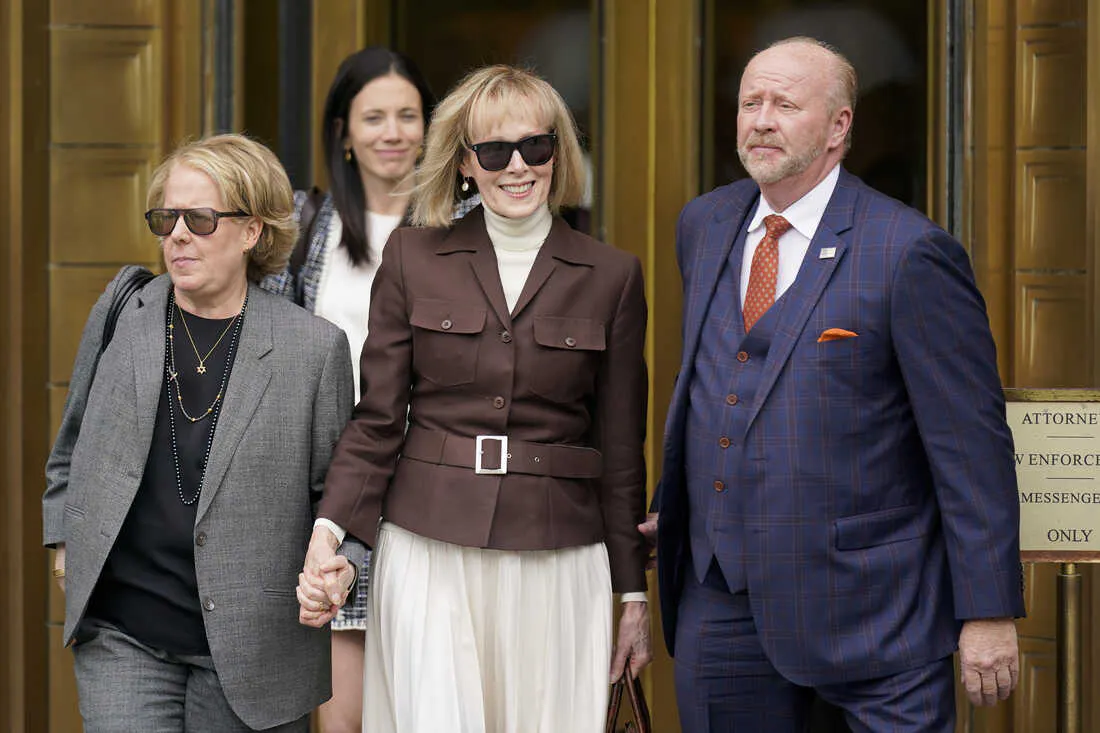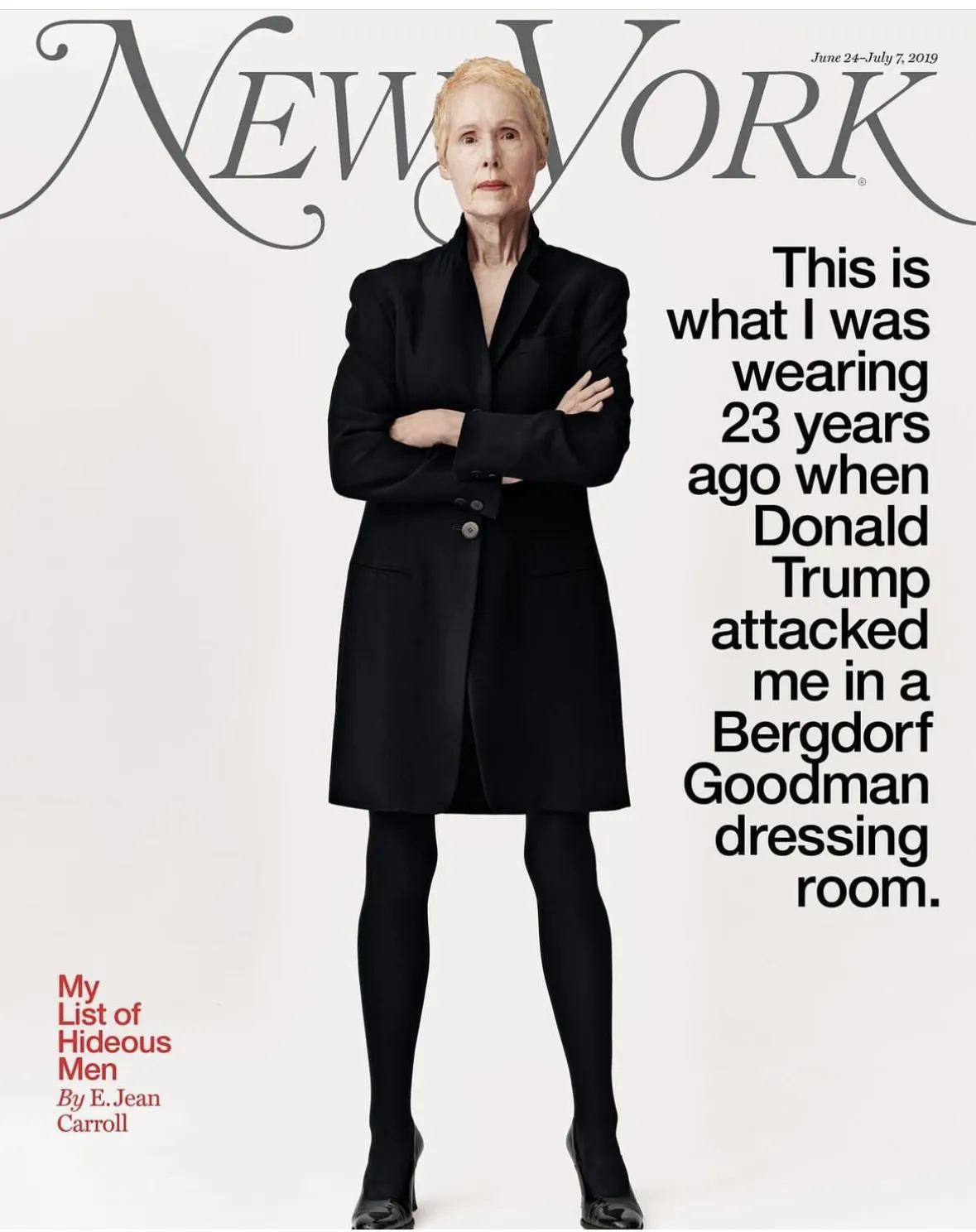We owe a huge debt to E Jean Carroll
She could have gone about her life, instead she stood up and took on her abuser, Donald Trump

E Jean Carroll leaving court in Manhattan on Tuesday
The Shift is moving home! From 1 June you'll find us over on substack. If you're an existing member, I'll do the moving for you. If not...
On Tuesday afternoon, a 79-year-old woman stood on the steps of a Manhattan courthouse and beamed – in celebration, in vindication, undoubtedly in sheer unadulterated relief. Because finally, the shame had gone. After 27 years, E.Jean Carroll had been believed when she stood up in court and said she was sexually assaulted by former US president (and likely prospective Republican candidate) Donald Trump. In a changing room, in uptown department store Bergdorf Goodman, in 1996. After a two week trial in a New York civil court, a jury made up of six men and three women found Trump had sexually abused* Carroll (but not raped, because the jurors could not reach unanimous agreement). He was also found to have defamed her by repeatedly accusing her of lying about it. A defamation he blithely continued once the verdict was announced, restating that he had “no idea who this woman is” – as if that makes any difference – and stating his intention to appeal. (Which means he won't have to pay the $5million in damages the jury awarded to Carroll while the appeal is ongoing.)
The fact Trump claimed not just to have no idea who E Jean Carroll was and said, repeatedly, that “she was not his type” (there are not enough eye roll emojis on the internet for that), was in fact one of the things that counted against him. Trump didn’t appear in court – far too busy playing golf for that –but, in a prerecorded deposition, he was shown a picture of himself and first wife Ivana (who also, for the record, accused him of violent rape in her 1990 divorce deposition) meeting Carroll and her then husband, John Johnson, in 1987, and mistook her for his second wife Marla Marples. So, y’know, definitely “not his type”.
Unless you’re a magazine obsessive, as I was for the first 40 or so years of my life, chances are you didn’t know who she was either, until all this happened. But I have known who E Jean Carroll was for decades and admired her just as long. Back in the 90s when I was features editor of New Woman (another resident in the magazine graveyard), her problem page in the US edition of Elle magazine was my lodestone. And her outspoken advice set a tone for a new generation of agony aunts. She was also a woman who lived the chic New York media existence of my fantasies. What I didn’t know, of course, was that around the time I thought she was living the dream, she was also being assaulted in a department store changing room by then-real estate magnate Donald Trump.
I don’t know if you’ve been following the trial, but regardless it probably won’t surprise you that Trump's lawyer subjected Carroll to a bombardment of the type familiar to anyone who’s ever been subject to sexual assault, abuse, harassment, rape etc. One she had clearly been expecting.
Why didn’t you scream?
"I’m not a screamer,” she said. “You can’t beat up on me for not screaming.”
Why didn’t you tell anyone?
She did, she told close friends. But asked them to do what you expect close friends to do, keep your secrets. Two of those friends testified to that effect at the trial.
Why didn’t you go to the police?
Because she was too “ashamed”. “I was born in 1943," she said. "I’m a member of the silent generation. Women like me were taught to keep our chins up and to not complain. I would never call the police about something I am ashamed of.”
She added: “I was never going to talk about what Donald Trump did.”
Like so many women before and after her, E Jean Carroll didn’t want to be defined by one of the most horrifying moments of her life. It was only when #MeToo happened – and, in particular Christine Blasey Ford's 2018 testimony that then-nominee for the Supreme Court Brett Kavanaugh had sexually assaulted her in 1982 – that Carroll decided she had to speak out. As with Blasey Ford, that was when the horror really began. When Kavanaugh was confirmed to the Supreme Court regardless, the backlash, trolling and hate forced Blasey Ford into hiding. Speaking out changed her life. It made not an iota of difference to his. As I type, he is now presiding over the decimation of the abortion rights of American women, amongst other things.
But her bravery made a huge difference to the many many women who had sat in silence until that point. The American establishment didn’t listen, but those women did. Tens of, hundreds of, thousands stepped up after decades of silence, shame and self-blame. E Jean Carroll was one of them. She didn’t havve to do it, any more than Blasey Ford did. She didn’t have to upend, to potentially destroy, her life, to see her reputation run into the ground. But she did it because she felt she had to. She did it because she knew she should.
She first told her story in New York magazine (Opens in a new window) in 2019 (below).

From then on there was no going back. I wonder how many times over the years since she asked herself if she’d done the right thing. When Trump called her a liar, trashed her reputation, made her the subject of pity and disbelief and she subsequently lost her job on Elle magazine. (On top of the fact that, as Carroll testified, he had already left her "unable to have a romantic life ever again".)
The statute of limitations had expired, so criminal charges were out of the question. But last year, New York state passed the Adult Survivors Act, allowing victims a one-year window to file a sexual assault lawsuit over older cases. And that is how the case ended up in civil court.
That is how, on Tuesday, E Jean Carroll's decision to speak out was finally vindicated.
No doubt this will run and run. Trump's appeal will make sure of it. No doubt it will make zero difference to Trump’s attempts to run for a second term in the White House in 2024. Already it has made less-than-no difference to Trump’s conspiracy obsessed MAGA supporters who are crawling all over social media decrying the so-called lies and calling bogus.
The thing is, much as I celebrate E Jean Carroll’s victory, much as it gives hope and momentum to the claims of the more than two dozen other women who have claimed to have been abused by Trump, much as it makes the hundreds of thousands (millions?) of others who’ve been raped or sexually assaulted and disbelieved, asked why they didn’t scream, go to the police, report it to anyone who’d listen, feel vindicated. It certainly tells us something about contemporary (American? Western? Patriarchal? Global?) society. It tells us what we have long suspected: that a man can be accused of sexual assault and it doesn’t make a blind bit of difference to how he's viewed by society at large. He can still run a business, run a country, make laws that affect the lives of millions of people, millions of women. He can still go on with his life.
We’re about to find out whether the same can be said for a man who is actually found liable for sexual abuse, albeit in a civil court. My hunch is it can. But at least it will be with the words "sexual abuser" attached to his name.
(*For the avoidance of doubt, the judge defined sexual abuse thus: Trump subjected Carroll to sexual contact without consent by use of force, and that it was for the purpose of sexual gratification.)


